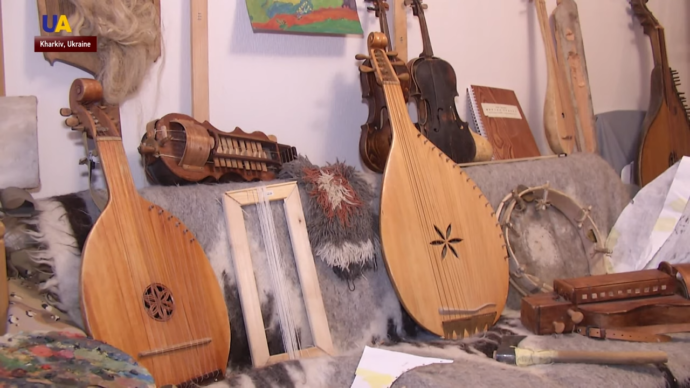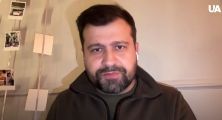Nazar Bozhynsky is an associate professor of the Kharkiv National University of Construction and Architecture. However, at the same time, he is a kobzar, a type of bard which keeps Ukrainian songs and traditions alive. He took up playing bandura, a plucked string folk instrument, as a kid. Later he learned the craft of making these instruments by himself. His background helped him to learn how to create precise schematics for woodwork.
“Since 2016, I completed this bandura. It is a copy of the one that Kobzar Mykhailo Kravchenko-Myrhorodslyi had. The original is stored in the Saint Petersburg Conservatory. It was made in 1840,” Bozhynsky said.
Nazar also has a lyra crafted on the basis of a design of an old instrument he saw in Kamianets-Podilskyi. Making this instrument was a complicated process, which is why he made the first version of it from cardboard and only later used wood.
“This instrument, unlike the bandura, is made from separate pieces of wood. The wooden parts are then bent to fit the shape of the instrument. Bandura and the Kobza are made from a whole piece of wood. A lyra, just like bandura, is made from willow, maple or linden. The cheapest lyra’s were made from less quality pine. But their sound is poor,” Bozhynsky said.
Nazar’s apartment also functions as his workshop. But there is no machinery of any sort since all of the instruments are crafted by hand. He performs using his self-made instruments. His hobby of being a kobzar has defined multiple aspects of his life, including his clothing, haircut, and lifestyle.
“Kharkiv had a lot of kobzars 100 years ago. Many of them were killed, some died natural deaths. But the understanding that kobzar culture is vital to being Ukrainian stayed in Kharkiv. And while in Kyiv and Lviv it is perceived as a tourist thing, a tourist trap, or a performance, here in Kharkiv it is seen as something customary. Even Poltava doesn’t have that,” Bozhynsky said.
Nazar has a goal – restoring the kobzar movement in Ukraine. That is why he is training people to play bandura, kobza, and lyra. Right now Nazar is preparing for a big festival that is to be held in Kyiv in summer. He is planning to bring new instruments, among them a tambourine that he spent 10 years making.













